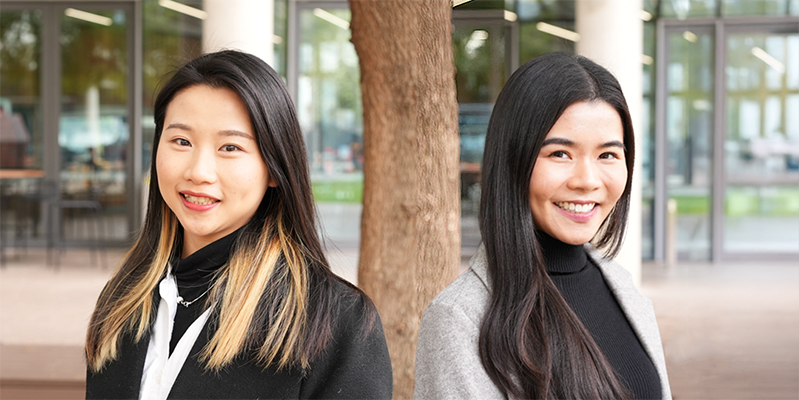Australia ranks in top three study locations for female international students
By Malvika Hemanth
 COMMUNITYZhiyin (Cleo) Chen (left), 28, from Guangzhou in southern China and Woranitha (Grace) Hueghansombat (right), 26, from Bangkok, Thailand, are both studying a Master of IT (Enterprise Management) at UniSA.
COMMUNITYZhiyin (Cleo) Chen (left), 28, from Guangzhou in southern China and Woranitha (Grace) Hueghansombat (right), 26, from Bangkok, Thailand, are both studying a Master of IT (Enterprise Management) at UniSA.New data reveals almost half of international students in Australia are female, with Australia ranking in the top three preferred study locations for this cohort.
Collated by the Australian Trade and Investment Commission in its Rise in international female students in Australia report over the past decade, the figures signify a more than 10% increase in female enrolments when compared with the last peak in March 2020.
As of March 2024, there were almost 332,500 female international students studying in Australia.
Driving this growth has been Chinese female students, with this group now surpassing their male counterparts. There has also been a noticeable increase in female students from southeast Asian countries including a strong contingent from the Philippines, followed by Thailand and Vietnam.
The report says the rise in female international student numbers aligns with Australia’s reputation as an inclusive and equal academic environment and a broader global shift towards gender equality in education.
Equal opportunity and respect for all recognised as Australia’s drawcards
Two students who have been part of this rise are Zhiyin (Cleo) Chen, 28, from China and Woranitha (Grace) Hueghansombat, 26, from Thailand.
Cleo and Grace, both in their final year of a Master of IT (Enterprise Management) at the University of South Australia (UniSA), were eager to enhance their skills through further education.
Having weighed up their choices between other international study locations, the pair decided upon Australia due its high standards, stable political climate and its emphasis on respect for all individuals.
For Cleo, open discussion about gender equality at university greatly appealed to her, helping her feel supported in her studies and personal pursuits.
“Back in China we don’t commonly talk about this topic in person. We focus more on the academic performance, but in Australia and at UniSA, they focus on the diverse development of the student, including not just academic performance but soft skills and your ability to interact within society,” she says.
“I have found it easy to interact with my peers and I feel equal here in Adelaide.”
Emails from UniSA about sexual harassment policies have also provided reassurance to Cleo if she were to encounter a situation where she may require assistance.
“Those emails have been very informative. I have never received emails like these back home and it lets me know UniSA is paying attention.”
For Grace, an only child, it was important her decision to study abroad gave her family peace of mind.
“I had the opportunity to study in the United States when I was younger, but my family was worried. They want me to pursue my dream of studying internationally and they felt safe for me to go to Australia,” she says.
Once in Australia, Grace was impressed by the country’s distinct strength in equality and multiculturalism.
“I like how Australia promotes inclusion and support for all,” she says. “Anyone can be a leader. It doesn’t matter about age, gender, nationality, marital status. Everyone can achieve their full potential without bias.”
Positive progress for gender equity
UniSA Education Futures lecturer and PhD candidate Maria Vieira, who delivers gender equity programs for schools and contributes to educational equity research at UniSA’s Centre for Change and Complexity in Learning (C3L), says there has been positive progress nationwide for championing women and their ideas, particularly those involved in STEM areas.
“There is definitely growing interest in this topic, which I’ve observed through increased attention and media coverage of my research in this field,” Vieira says.
“In 2022, we received a grant from the Commonwealth Department of Employment and Workplace Relations, through the National Careers Institute Partnership Grants. With that we implemented the South Australian Academy for Gender Equity in STEM (SAAGES) report in 2023.”
This year Vieira was awarded a prestigious $10,000 Clare Burton Memorial Scholarship, which recognises research aimed at improving gender equity in areas such as employment, education, health, communications, engineering and science.
Vieira says she would like to see more substantive evidence collected on international students and their education outcomes to accurately determine their long-term positive impact.
“Increasing student enrolments does not necessarily lead to higher course completion rates or workforce retention unless there is a conscious effort to support students throughout the entire pipeline,” she says.
“The key is that we’re working towards equity, and being able to visualise and break down data from disadvantaged cohorts is essential for making informed, data-driven decisions.”
Grace, who thought a leadership position in STEM was not within her grasp as a young girl, will start a graduate position at financial company, KPMG, as a technology consultant in 2025.
“When I saw the world, [and] did my research, I saw there are opportunities out there for females.”
International education is Australia’s largest services export and was worth a reported $47.8 billion in the 2023 calendar year.
Other Stories
- Social media likes and comments linked to young men’s obsession with perfect pecs and a six-pack
- Say what? Verbal assessments replacing exams in some subjects
- What’s the difference between gelato and ice cream? Is one healthier?
- GPS alternative for drone navigation using visual data from stars
- From the Vice Chancellor: Do or do not
- Achievements and Announcements
- Australia ranks in top three study locations for female international students
- Students race to the finish line at the ‘STEM Speedway’
- UniSA News In Pictures: Unstoppable Awards





